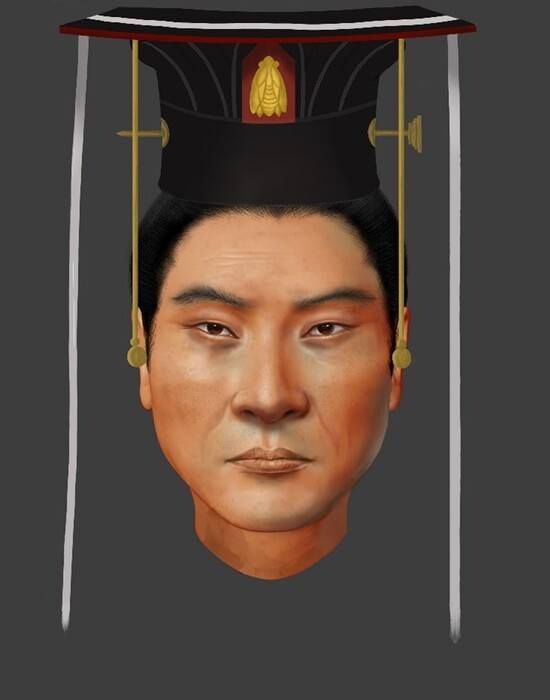After burying Ludwig van Beethoven, on March 27, 1827, two of his friends and associates found a letter hidden in his desk when they were sorting his papers.
Written years before, in 1802, when he was 32 years old, it was addressed to his brothers Karl and Johann and was a living testament.
In the letter he showed his tremendous anguish over the progress of his deafness, even confessing that if it weren't for his virtue and music, he would have committed suicide.
In the final part of the so-called Heiligenstadt Testament, the composer asks them, when he dies, to call his doctor to describe his illness and make it public and thus, he writes, "at least the world will reconcile with me after my death." .
But the doctor could not fulfill his wish because he had passed away years before.
Now, almost 200 years later,
a large group of scientists have been able to fulfill it by analyzing several strands of his hair.
DNA recovered from the hair gives clues to his health problems, his cause of death, and something unexpected: Beethoven might not actually be a Beethoven.
The pianist and composer was already venerated during his lifetime and therefore it is not surprising that there are relics of his scattered around half the world.
As far as is known, there are 34 locks of his hair in private hands or in those of companies of friends of his music.
Taking advantage of these relics, a large group of scientists wanted to investigate the genetic basis of Beethoven's ills and death.
They were able to analyze five of the most believable strands, and the story that follows, told in detail in the scientific journal
Current Biology
, beats any episode of
CSI
.
More information
The blood of the revolutionary Marat reveals his agony 200 years later
Beethoven's complete genome sequencing has found no genetic basis for the deafness that came on suddenly at the age of 26.
The illness, which began with episodes of tinnitus and loss of the highest frequencies, worsened until it left him deaf while plunging him into despair.
Deafness prevented him from continuing to play the piano already at the age of 46.
Another of the ills that accompanied the musician for most of his life were serious gastrointestinal problems of unknown origin, which manifested themselves in intense abdominal pain and periods of continuous diarrhea.
Although several causes have been pointed out, in Beethoven's genome there are no indications that he was celiac or lactose intolerant, nor that he had harmful variants in the genes most related to the digestive system.
Ludwig van Beethoven, after a portrait by Joseph Karl Stieler.pxfuel
"We couldn't find a definitive cause for Beethoven's deafness or gastrointestinal problems," says Johannes Krause, an expert on DNA and past pathologies at the Max Planck Institute for Evolutionary Anthropology and co-author of the study.
Krause adds immediately: "However, we found a number of genetic risk factors associated with liver disease."
In the summer of 1821, the musician had his first recorded episode of jaundice.
The yellowish color of his skin indicated that something was wrong with his liver.
“We also found evidence of an infection with the hepatitis B virus [contracted] at most months before the composer's last illness.
All this probably contributed to his death, ”he ends.
Already after the autopsy and the two subsequent exhumations of his body, cirrhosis was indicated as the final cause of Beethoven's death.
To the genetic predisposition and hepatitis, alcohol consumption should be added to the table, especially the wine that the musician liked so much.
For years, he always carried a notebook with him so that his interlocutors would respond in writing when he yelled at them fearing, unable to hear himself, not to be heard.
These
Conversation Notebooks
are a unique diary to learn about the daily life of the composer.
We could not find a definitive cause for Beethoven's deafness or gastrointestinal problems.
However, we discovered genetic risk factors for liver disease."
Johannes Krause, an expert in DNA and pathologies of the past at the Max Planck Institute for Evolutionary Anthropology
Tristan Begg, a scientist at the University of Cambridge, is the first author of the research.
In a note he says: "We can assume from the
Conversation Notebooks
that their alcohol consumption was very regular, although it is difficult to estimate the volumes consumed.
While most of his contemporaries claim his consumption was moderate by early 19th-century Viennese standards, there is not complete agreement among these sources, and it is likely that this equates to amounts of alcohol known today to be harmful to the body. the liver.
If your alcohol consumption was large enough over a long enough period of time, the interaction with your genetic risk factors presents a possible explanation for your cirrhosis."
So the combination of genes, hepatitis and alcohol could have taken him to the grave.
an extramarital affair
Although it was not the aim of the study, opening the box of genes can have unexpected consequences.
The researchers verified that Beethoven's Y chromosome does not match that of any of the five current distant relatives who bear the same last name and share, according to genealogical records, a common ancestor with the musician on the paternal line.
This chromosome is transmitted exclusively from parents to children and, except for mutations, does not change.
But the male Van Beethovens who live today (in the Belgian region from which the composer's grandfather emigrated to Germany) have a different Y chromosome.
As Maarten Larmuseau, an expert in genetic genealogy from the Catholic University of Louvain, says, "by combining DNA data and archival documents, we were able to observe a discrepancy between the legal and biological genealogy of Ludwig van Beethoven."
The mystery can only have one explanation: there had to have been at least one extramarital affair with descendants on Beethoven's paternal line.
The problem is that, without other reference family genetic data, they don't know when it happened.
There were seven generations of Van Beethoven between the conception of Hendrik van Beethoven, the oldest known ancestor, in 1572, and that of Ludwig van Beethoven in Bonn, Germany 200 years later.
The absence of a record of his baptism had cast doubt on the paternity of the musician's father, but genetics cannot settle this question for now.
There had to have been at least one extramarital affair with offspring in Beethoven's paternal line, but for now genetics can't decide who.
The genetic analysis allowed the scientists to rule out three of the eight hair samples they initially had.
One of them, the so-called Hiller lock, could not be the musician's, since it turned out to be that of a woman.
Analysis of him at the turn of the century discovered that those hairs belonged to someone suffering from lead poisoning, to which all the composer's ills were blamed.
The remaining five locks belong to the same Central European man with genes that match those of current inhabitants of the German state of North Rhine-Westphalia, the region where Beethoven was born.
In addition, the rate of degradation of the DNA recovered from the hairs indicates that they were plucked out in the first third of the 19th century.
All this, together with the fact that the samples have been traceable and are well documented,
Allows you to assume that they are authentic.
Based on this assumption, researchers from the University of Cambridge (United Kingdom), the Max Planck Institute for Evolutionary Anthropology (Germany), the Catholic University of Louvain (Belgium) and thirty other institutions investigated the composer's genes to try to answer Your request.
Geneticist Carles Lalueza-Fox is one of the foremost experts in ancient DNA and was a reviewer of the Beethoven research prior to its publication.
Regarding the extramarital affair, he recalls that there is a lack of data on the individuals between Beethoven and the Belgians who bear the same last name.
“If the analysis were carried out with people from today, it could be said that Beethoven is not a Beethoven”, comments the scientist from the Institute of Evolutionary Biology (UPF-CSIS).
Beyond the family matter, Lalueza-Fox, stands out for the strength and quality of the new studio.
"This is the first time that a high-quality genome of a historical figure has been obtained, it is as if it had been done from a living person," says the geneticist, who carried out similar work with the blood of Jean-Paul Marat, one of the revolutionaries who led the French Revolution.
Regarding the conclusions of the work, Lalueza-Fox poses the following question: "If we now all had our own genome, would it be easy to predict the diseases we will have?"
There are some that are genetic, even caused by mutations in a single gene, but most are a combination of heredity and environment.
And she relates it to the cause of Beethoven's death: "The mutation in a gene [found in Beethoven's DNA] implies a predisposition, which is always an increased risk, but if you are teetotaler, it does not predispose you at all."
Be that as it may, science has fulfilled Beethoven's wish two centuries later.
You can follow
MATERIA
on
,
and
, or sign up here to receive
our weekly newsletter
.



/cloudfront-eu-central-1.images.arcpublishing.com/prisa/ZV3HRONFCNGOLA37LDSKYTU2VY.jpg)





